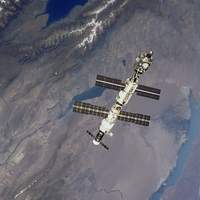USA’s plans to send astronauts to Moon and Mars block scientific research on ISS
The United States is not getting its money's worth out of the international space station, John Glenn said on the 45th anniversary of the day he became the first American to orbit the Earth.

Diverting money from the orbiting research outpost to President George W. Bush's goal of sending astronauts back to the moon and eventually on to Mars is preventing some scientific experiments on the space station, Glenn told an audience of about 300 high school students and space enthusiasts at the COSI Columbus science center on Tuesday.
"To not utilize that station the way I think it ought to be utilized is just wrong," said Glenn, 85, also a former U.S. senator.
Glenn made three trips around the planet inside his Friendship 7 capsule on Feb. 20, 1962, making him a national hero and proving that the nascent NASA space program was competitive with the Soviet Union, which had accomplished a manned orbital flight a year earlier.
In 1998, Glenn, then 77, flew on the shuttle Discovery and became the oldest person ever in space.
He said he supports the president's moon and Mars goals but not at the expense of the space station, which is only two-thirds complete.
NASA and its international partners, including Canada, Japan and Russia, hope to finish the space station in 2010, but no decision has been made to extend its operation past 2016, the AP reports.
Glenn, a Democrat who represented Ohio from 1975 to 1999, said the station should not be abandoned, especially after costing taxpayers billions of dollars (euros).
"We will not even begin to realize its potential," he said.
A White House spokesman said Tuesday night that officials were not prepared to comment. Messages were left after business hours at NASA headquarters.
Subscribe to Pravda.Ru Telegram channel, Facebook, RSS!




